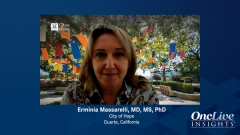
Key Differences Between Amivantamab and Mobocertinib in NSCLC
Shared insight on the differences between amivantamab and mobocertinib and when they may be appropriately used in patients with NSCLC.
Episodes in this series

Transcript:
Erminia Massarelli, MD, MS, PhD: One important difference is that amivantamab is given intravenously, and mobocertinib is given by mouth. Depending on the patient population, there could be some preference for either IV [intravenous]or oral medication. The other important thing we need to consider as medical oncologists is the toxicity profile, so we do tailor therapy according to the patient’s preexisting conditions and other comorbidities. There are at least 2 options now to choose between, but the major differences are in the toxicity profile and administration.
Catherine Ann Shu, MD: Mobocertinib is an oral pill, so that may make a difference for some patients. Amivantamab is given via IV, and it’s given on day 1 and day 2. It’s given weekly for the first cycle, so for the first few weeks, and then after that it’s given every other week. That can be more taxing for patients who have to come into an infusion center.
Mobocertinib is an oral pill. The ORR [overall response rate] seen with mobocertinib was a bit lower. It was 28% vs 40% with amivantamab. The median duration of response with mobocertinib was 17.5 months. In terms of toxicity, for mobocertinib, treatment-related AEs [adverse events] that were grade 3 and above were 46%.The majority of patients, 90%, had diarrhea, and I think 21% were grade 3 to grade 4. So there can be significant diarrhea, and rash in about 45% of the patients.
There are some differences in the toxicity profile, and amivantamab has that infusion-related reaction that we had discussed. But the grade 3 and above AEs were a little bit lower at 35%. I think both drugs provide our patients with great options we didn’t previously have. I think it’s exciting to have 2 things for these patients now.
Transcript edited for clarity.






































